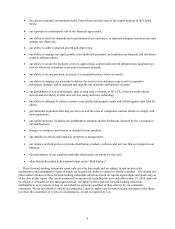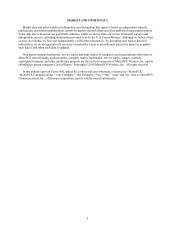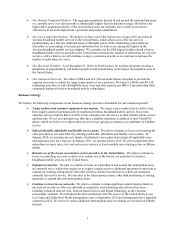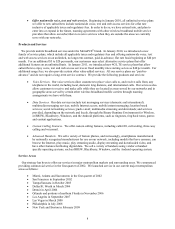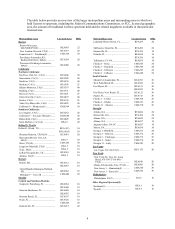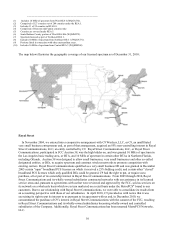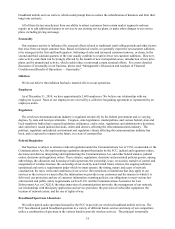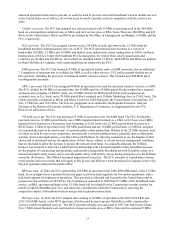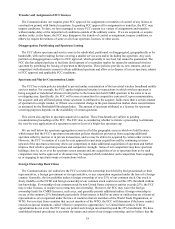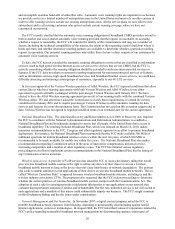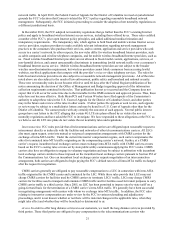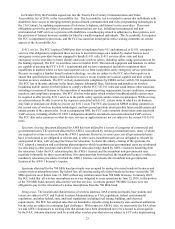Metro PCS 2010 Annual Report Download - page 23
Download and view the complete annual report
Please find page 23 of the 2010 Metro PCS annual report below. You can navigate through the pages in the report by either clicking on the pages listed below, or by using the keyword search tool below to find specific information within the annual report. 13
Time Warner Cable, Comcast and Cox Communications. These cable companies, along with cable company
Advance/Newhouse, formed a joint venture called SpectrumCo LLC, or SpectrumCo, which bid on and acquired 20
MHz of advanced wireless services, or AWS, spectrum in a number of major metropolitan areas throughout the
United States, including all of the major metropolitan areas in which we have built.
In the future, we may face increased competition from other mobile satellite service, or MSS, providers, and from
resellers of these services. The FCC has granted some MSS providers, including Lightsquared, the flexibility to
deploy an ancillary terrestrial component, or ATC, to their satellite services. This added flexibility, which has been
granted to some and may be granted to other, MSS operators, may enhance their ability to offer more competitive
mobile services. Some of the MSS providers currently are in bankruptcy. As a result, their future plans are
uncertain, but they may emerge from bankruptcy in a better position to compete with services we sell or plan to sell
or may sell or lease their spectrum to others, including new entrants, who may compete with us. In addition, several
large satellite companies, computer companies, and Internet search and portal companies have indicated an interest
in establishing next generation wireless networks, and certain VoIP providers have indicated that in the future they
may acquire FCC licenses or use unlicensed spectrum to offer wireless services to compete directly with us. The
FCC also has adopted an order that allows companies to provide wireless services on an unlicensed basis in certain
unused portions of the television spectrum. Further, we also may face competition from new entrants and others
using exclusively licensed or unlicensed spectrum. Additionally, we may compete in the future with companies that
offer new technologies and market other services we do not offer or may not be available with our network
technology, from our vendors or within our spectrum. Some of our competitors bundle, or may bundle, these other
services together with their wireless communications service, which customers may find more attractive. Energy
companies and utility companies also are expanding their services to offer telecommunications and broadband
services.
There continues to be substantial merger and acquisition activity in the wireless industry. We have in the past
acquired, and may in the future acquire, spectrum to enter new metropolitan areas or increase our spectrum holdings
in metropolitan areas where we currently offer service. We also have undertaken and, may in the future consider,
acquisitions of, or other business combinations with, companies in addition to acquisitions of spectrum. We also
have in the past had, and may in the future have, discussions between us and other companies regarding potential
acquisitions, divestitures, other business combinations, or transactions between the companies.
Many of our competitors’ resources are substantially greater, and their market shares are larger, than ours. For
example, a number of our competitors have significantly greater spectrum, capital, financial, marketing, human
capital and other resources than we do. Additionally, many of our wireless competitors have networks with larger
coverage areas, significantly larger spectrum holdings, offer nationwide calling plans that do not give rise to
additional roaming charges for their customers, and offer international voice and data roaming options for their
customers. Further, the marginal incremental cost of some of our competitors may be substantially lower than our
cost to provide service and may allow such competitors to price their services at rates that we cannot profitably
provide.
In some instances, large national wireless broadband mobile services carriers have been reluctant to enter into
roaming agreements at attractive rates with smaller and mid-tier national carriers like us, which limits our ability to
serve certain market segments, and recent FCC actions to promote automatic roaming do not resolve these
difficulties. This competitive pressure also may increase as our basic service plans now include nationwide service.
The policies of the United States government have made, and may continue to make available either through new
allocations or flexibility in use of existing spectrum allocations, additional spectrum for wireless services available
in each of our markets, which may lead to an increase the number of competitors and services competitive with our
services and may enhance our competitors’ ability to offer additional plans and services. Further, since many of our
competitors are large companies with significantly more subscribers and can sell to a larger portion of the United
States population, they have on occasion been able to, and may in the future be able to, convince handset
manufacturers to provide the newest handsets exclusively to them. Further, one manufacturer of wireless products
has sold its handsets directly to the public without including service and others may do so in the future. Certain of
our competitors also can afford to offer handsets to potential subscribers at lower prices than us because they
subsidize more of the price of a subscriber’s handset, they may purchase handsets at lower prices from
manufacturers than us, they have greater resources than us, they have a different business model than us, and they
may require their customers to enter into long term contracts. The FCC has indicated it may examine, and Congress
is considering legislation that may limit, early termination fees for the long term contracts used by national wireless



